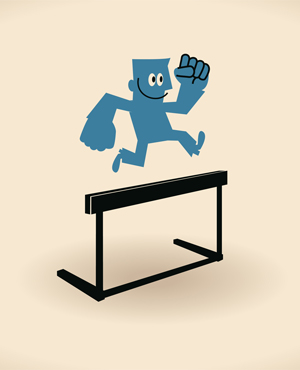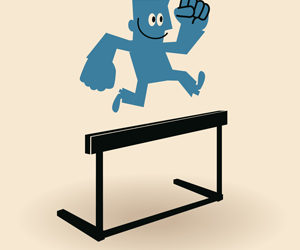 Become a genius. Or, if you already are one, develop genius status in some other untapped passion of yours.
Become a genius. Or, if you already are one, develop genius status in some other untapped passion of yours.
So, how do you ignite your inner genius?
First, consider that you might not end up the best chess master, the best mathematician, or the best gymnast, even if you start learning today. After all, the younger you are the better your chances. But, you might find yourself in a major competition?possibly a global one?with a chance of winning?if you start today.
K. Anders Ericsson, leading psychologist on human excellence, wrote Peak: Secrets from the New Science of Expertise. Ericsson gets cited by all the bestselling psychologist authors (including Seligman, Duckworth, and Gladwell). And he kindly gave me a galley of his book to read before it hit the market.
In his book, Ericsson reveals the secrets of prodigies and geniuses. According to Ericsson, you?yes, you?stood a chance of becoming a music prodigy, a math prodigy?even a world champion.
From my view in the fishbowl, I achieved top scores in math not because I was born with a math gene, but because my older brother spent hours coaching me. He said, “Just do well in math,” and that I did. I didn’t get a PhD. in math or win a Nobel prize, so I’m a far cry from a genius?but with the right grooming, I might have solved a century long math puzzle. Just ask Ericsson.
So, here’s the secret of genius, Ericsson style.
The first step: expose the child to toys that in reality are objects you want the child to master.
Expose your children to whatever you want them master. Put little musical instruments in their toy boxes, give them chess boards and chess pieces to chew on (as long as they don’t swallow them), get nifty paints and canvases for them to splash and spray. Whatever you want your children to master, introduce that thing as a toy.
We once had an organ, and I started learning the notes and playing songs. But Mom sold the organ shortly thereafter. Mom also taught me how to knit, but we butted heads. And my brother had a microscope, but criticized my drawing of a germ. In spite of his criticism, he gave me the “science” love bug.
But if I had received praise, support, and tons of funding from my parents, chances are any of the above playful things could have become my areas of expertise, according to Ericsson.
True to my situation, Ericsson says our older siblings can motivate us. My older brother did just that. He spent hours teaching me roman numerals, carrying the one in addition, experiments, science, reading comprehension, and the planets in the solar system.
When I started grade two, I had a test that would separate me into the “smart” side of the class. In this test, we had to know the colors of crayons. My older brother advised me to get the teacher to spell the name of the color on the board, and then, when I saw the spelling of the name, to match it with the word on the crayon. I did, finding myself soon labeled as gifted. My brother gave me an edge from day one.
Although my brother loved the powers of intellect, Mom didn’t value education. But she read a lot. Ericsson says children of parents who read to them and value education can inspire expertise in academics.
Step 2: Find ways to motivate the child.
Ericsson says to reward children with treats to help motivate them. As a tutor, I once coached children in math and brought candy as rewards. It seemed to work.
Also, if you want your child to dance or play the piano, try getting your child to perform publicly. If your child likes performing, then stage gigs might further motivate your child to dance or play the piano.
An old frenemy once performed dance in musical theater as a child. The experience proved thrilling for her, so she dedicated the rest of her life to professional dance. Ericsson says, if the motivation doesn’t come from the child, the child will likely abandon the activity. So, make it fun.
Ericsson says that fellow teammates can also motivate a child to perform. The common bond and goals can strengthen anyone’s convictions. As a young athlete, I enjoyed lots of support from fellow team members. So, I joined every single team available at my school, taking home the bronze medallion for top athlete in my final year of junior high. (Not only did I get a lot of awards for athletics, I also got a lot of penalties?hence the bronze.)
And for parents wanting their child to score high academically, make plans for an university education early on and encourage higher education at every opportunity. My dad had reverence for the highly educated; that is, until I got a master’s degree and he discovered how little I actually knew.
Step 3: Spend a fortune.
For your child to get to top performance, you’ll need the best coaches (and travel or relocate to access them). You’ll also need to pay for professional equipment and endless training.
Ericsson says to go professional, but you will likely need to spend around $30,000 a year on training and equipment for one child.
My step-brother had thousands of dollars thrown at him in hockey equipment while the rest of us siblings languished. My step-brother never made it to the big leagues, but he did drop the puck for one Stanley Cup game playoff. If he learned hockey from a former NHL player, rather than from my step-dad, his chances of going to the big leagues may have soared.
Even if you don’t have ambitions of entering the big leagues, how about going to the Olympics or Worlds? Anyone in Calgary would delight to know that the U of C had, and I believe still has, world class coaching for wrestling. So, if you mix courses from Athabasca with the U of C, you have affordable, world-class coaching at your disposal. Start weightlifting six hours a week, join the team once you’re in shape?and find yourself standing on the winner’s podium of an Olympic game.
Don’t Get Discouraged
But what if you’re over 20 or over 50 or 80 even? Don’t get discouraged. Although athletes reach their high point at age 20, Ericsson says that people can train in their 80s?and even 100s. Nothing is stopping you from putting in the time, effort, and money to hone that skill. And who knows, you may not achieve world-class performance, but you might gain expert status at your chosen activity.
I didn’t end up a genius. But I can cook a mean borscht, hypothetically.
So, push aside your Dungeons and Dragons, and seek out an AU program. Go for the rocket science, like science or statistics or computer science. After all, you’re headed for Mensa.


